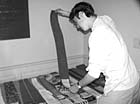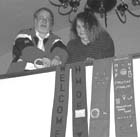
|
Discrimination
in the church By Bethany
McCormack This week about 200 stoles will adorn the walls of Robert Carr Chapel in a colorful statement of the reality of the discrimination taking place toward homosexuals in churches across the country. The stoles
are part of the Shower of Stoles Project, a collection of stoles
from ordained clergy and religious organizations in support of gay,
lesbian, bisexual and transgendered people who have been refused
ordination by various denominations or are serving in churches while
keeping their sexual orientation secret. Darryl Kistler, a third year Brite Divinity student, said the project’s message is particularly meaningful because the stoles represent discrimination that occurs in the church, a place where it is least expected. “We hear and preach inclusion for all, but then these stoles show (hundreds of) people who have been denied because of their sexual orientation,” Kistler said. A stole, which is a strip of cloth worn by ministers during worship, is also a historical symbol that holds special meaning and can be traced to early in church history, Kistler said. “It’s a symbol of authority and God’s grace that has been taken away from these people,” he said. The majority of the stoles were sent in anonymously by gay, lesbian, bisexual and transgendered people, according to the Shower of Stoles Project Web site (www.showerofstoles.com). Some of the stoles were sent in by family or friends to honor a gay loved one, while others were sent in by churches to honor members of the congregation. Straight allies send in “signature stoles,” which are covered with the signatures of supportive congregation members. Kistler said viewing the stoles was a meaningful and overwhelming experience for him. “Each stole is as unique as the person it represents,” he said. “It’s a breathtaking display of beauty. Breathtaking and saddening.” Michal Anne Pepper, a senior at Brite, said she was moved by the stories behind the stoles. “Each stole has a story,” she said. “Most of them are heartbreaking, talking about having to leave the church or serve in the church and be completely isolated.” The stoles serve as a reminder to the damage done to a population that is often overlooked, Pepper said. “I think (the project’s) strength is it makes it vivid and real the damage the church does and how much the church loses in terms of talent and strength,” she said. The project began in 1995 when Martha Juillerat resigned her ordination in the Presbyterian Church after years of hiding her sexual orientation, according to an article from the St. Paul Pioneer Press. Eventually it became too hard to keep her secret any longer, and Juillerat asked other gay and lesbian clergy to send her their stoles, which she hung on the walls of the room where she gave her good-bye speech, according to the article. “When I spoke, I said, ‘These stoles represent the friends who are with me today in spirit,’” Juillerat said in the article. “It moved people to tears. It made it obvious that we weren’t just talking about me. We were talking about hundreds of folks who are denied the opportunity to openly serve their church.” Juillerat now travels the country speaking at various congregations and churches and displays the collection, which has grown to include more than 800 stoles from 14 denominations and five countries, according to an article in The Kansas City Star. Pepper said she is hopeful that the church will move toward inclusiveness.
Denominations that do ordain homosexuals include Unitarian Universalist Association, the United Church of Christ, Reform Judaism and some Episcopal churches, according to an article by the Associated Press. The Presbyterian Church and United Methodist Church are both seriously divided on the issue of ordaining non-celibate gays and lesbians while many other denominations accept homosexuals to the clergy only if they are committed to celibacy, according to the article. Kistler said he hopes that eventually the church will no longer regard sexual orientation as a factor influencing ordination and that it will cease to even be an issue. “The Christian Church is slowly moving in that direction,” he said. “We’re working against 2,000 years of church tradition. In 30 years many groups and churches have come around.” The stoles are being brought to the Robert Carr Chapel by Campus Advocates for Peace and Social Justice at Brite, a gathering of students, faculty and staff who champion social justice issues, said Kistler, who is the group’s moderator. “This has obviously been a hot topic for the Christian Church for a while,” Kistler said. “More importantly for us, we’ve had two or three members at Brite who’ve been denied the opportunity to even start the ordination process because they are lesbians. This is the most vocal act of solidarity we can do for them.” Kistler said that by bringing the stoles to Brite, CAPS hopes to inform people to the fact that this issue exists. “There is still a group of people not being taken seriously and not being validated by the church,” Kistler said. “The public and church need to be reminded that this group isn’t going away and has many valid candidates.” The Shower of Stoles Project will be on display today through Thursday in the Robert Carr Chapel. Juillerat will lead a worship service at 7 p.m. today in the chapel and will discuss the project with students and faculty at noon Wednesday in Weatherly Hall. A devotional service will take place at 4 p.m. Thursday in the chapel as the project is taken down. Bethany
McCormack
|
The TCU Daily Skiff
© 1998, 1999, 2000, 2001
Web Editor: Ben Smithson
Contact Us!


 “My
confidence is that the spirit will continue to work to more openness
to embody the gospel message that Jesus taught,” she said.
“My
confidence is that the spirit will continue to work to more openness
to embody the gospel message that Jesus taught,” she said.